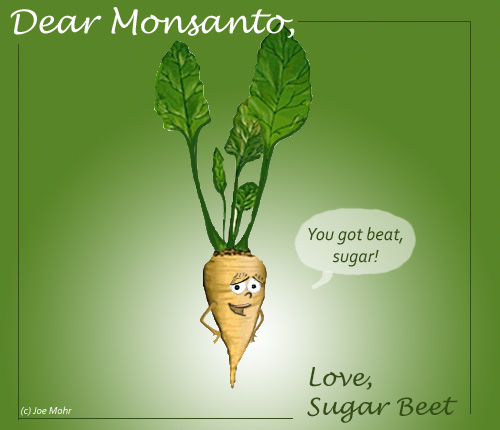A victory for anyone who likes healthy food, soil, and water! Monsanto‘s sour plans for the sweet beet were spoiled as a federal judge banned genetically modified sugar beets.
This is great news and hopefully a large step forward to getting food production back on a less toxic track.
Sugar beet, you are a beacon of hope for your genetically altered veggie brothers and sisters.
U.S. District Judge Jeffrey S. White you are a beacon of hope for humans who eat food and drink water.
Follow all of Mean Joe Green’s environmental cartoons on JoeMohrToons.com and on Twitter at @GreenCartoons.


No evidence of GMO crops being a problem? Someone said. Are you kidding?
GMO soy is one of the more allergenic foods there is.
Monsanto GMO crops were made to be Roundup ready. No crop “requires” toxic chemicals to be sprayed on them. There are ways around this with natural substances and healthier farming techniques. But, profit seems to come before “quality product” these days, so non-sense seems to “make sense.”
Look it up, GMO soy produced less yield, not more.
Quality food requires quality soil, and some common sense approaches.
Altered food is not necessarily going to be good for you. In fact with some of the altered plants, they could become quite toxic to the human body. I for one, don’t want some chemical company (Monsanto) with a shady past taking over my food supply, and making us dependent on them to provide us with plants that ends up with sterile seed. So, you gotta keep buying from them, year after year, paying a fee for their crappy seeds.
Monsanto is run by dirty people, who care nothing about helping mankind.
troy
While it is tempting to celebrate a defeat for the big corporation (with a less than ethical track record), and while there are ecological concerns about GM crops spreading out into wild population of plants (which have unknown ecological impacts), one has to sometimes consider the lesser of two evils.
GM crops hold the very real promise of preventing crop failures from drought, pestilence and other pathogenic invasions through conferring resistance and a more robust growing cycle. In some cases, GM crops may also provide human resistance to disease through protein inoculation.
Now, there are some wild type varieties and “landraces” of various grains (such as wheat) that are naturally more resistant to diseases (like fungus rot), or that withstand dryer conditions. These are being explored. But most of this is hit or miss and there are political obstacles to using even these (which come from developing world seed banks).
The belief that GM foods harm, or might harm, humans, is yet lacking any evidence to support it. This does not mean that we can give the green light to all GM products. It means that we need to ramp up research in tandem with GM seed utilization. That said, we shouldn’t let fear kill one of the most promising technologies for solving the world’s hunger and food security issues.
Michael….a very sensible comment! Thanks!
OK fellas. Regardless of sugar beets and the fact (your facts) that they may require insane amounts of pesticides (how did they survive the pre-pesticide years?) ANY win vs Monsanto and GMOs is a win for all.
Good try. But please, beet it!
Joe
Joe,
of course Sugarbeets were grown before pesticides, and of course they survived. But common sense should tell you that it is not sustainable to go back to that kind of farming. Please dont say ridiculous misleading things like you did above, and I quote “This is great news and hopefully a large step forward to getting food production back on a less toxic track.” That is pure ignorance of the subject on your part. By the way, those facts are not “my facts”, they are just “facts”, and absolutely TRUE facts.
For more on Monsato and it’s stranglehold on farmers and the food industry, everyone should see the documentary film, “Food, Inc.”. It was nominated for an Academy Award for Best Documentary Feature.
FOOD, INC. is enlightening and essential viewing for the American public. More information on this film can be found here: http://www.foodincmovie.com/
Another resource on this important topic is here: http://http://www.takepart.com/foodinc
Actually, this is not good for farmers or the environment, or anyone else.
-Farmers love these beets and plant them on 95% of the Sugarbeet acres in the US.
-Conventional beet seed is not plentiful and very available for the farmer.
-If you have a clue about sugarbeets and pesticides used, you would realize that conventional beets use many more herbicides and will now require farmers to make more trips across these same fields to apply these herbicides.
– You should also know that the resulting sugar from the Roundup Ready variety is IDENTICAL to sugar from conventional beets. There is no difference.
Yeah, well JJ, you eat them then… and thank Monsanto for all of their very graceful actions with regards to all of their genetically modified abominations up until now.
The above article states that food production is now on a less toxic track. Conventional sugarbeet production requires five applications of a tank mix of herbicides. Roundup ready technology eliminates four of those applications. (one Roundup application vs. five Progress/Upbeet/Stinger tank mix applications) Be careful what you ask for…